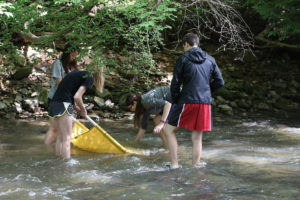Allegheny College Receives Grant to Support MLK Program in Meadville
Allegheny College has received a grant of $44,549 from the North American Association for Environmental Education (NAAEE) in partnership with the National Oceanic and Atmospheric Administration (NOAA) and supported by the U.S.Department of Education.
The grant will allow the college’s award-winning Creek Connections program, an environmental education outreach program that brings hands-on environmental education to K-12 schools throughout western Pennsylvania, to bring their outreach activities to middle school students who participate in the Dr. Martin Luther King, Jr. Mentoring Program, an after-school program at Meadville Area Middle School. Grant monies will be used to pay for staff time, water-testing supplies, transportation and staff development, said Wendy Kedzierski, director of Creek Connections.

“We are so excited for this opportunity to bring watershed-based education to the Martin Luther King, Jr. Mentoring program, which is a 21st Century Community Learning Center. The grant will allow us to get to know the program and the staff, students and parents who are a part of it and make it a success every year,” said Kedzierski. “We will bring hands-on Science, Engineering, Technology and Math (STEM) learning to the students with a focus on watersheds, especially our local French Creek watershed. French Creek is the perfect focal point for learning as it is well known outside our area for the unique level of biodiversity found within it as well as very familiar locally as a community treasure.”
Dr. Armendia Dixon, director of the MLK Mentoring Program, said she encouraged the Creek Connections administration to look into NOAA’s 21st Century Community Learning Center grant opportunity because it seemed ideal for Creek Connections and the MLK Mentoring Program. “I’m very thankful that our students will be doing project-based learning about French Creek, one of our county’s richest natural resources,” Dixon said.
Two students who are rising seniors and environmental science majors at Allegheny say they are eager to mentor junior high students through the new partnership.
“This will be my last school year teaching with Creek Connections, and I am so excited to start it off by working with students in the MLK summer program,” Isabella Petitta said. “I am hoping that this collaboration will allow the students to learn more about freshwater ecology and develop interests that could lead to future careers. I am looking forward to learning from the students as well and allowing their questions to change my perspectives on topics I have been teaching through Creek Connections.”
Gretchen Barbera said she is looking forward to bringing the “joy of science and the natural world to junior high students with the MLK program. Through this program, we will be getting students out in nature to develop new passions in science and to learn about the world around them. This summer we have the unique opportunity to focus directly on watershed properties and their purposes in the environment from French Creek to the Atlantic Ocean.”
The NAAEE, in partnership with NOAA and supported by the U.S. Department of Education, awarded $2.35 million to 29 environmental education organizations. NOAA and the 21st Century Community Learning Center (21st CCLC) partners will deliver authentic STEM experiences that use components of the NOAA Bay Watershed Education and Training (B-WET) Meaningful Watershed Educational Experience (MWEE) model along with other NOAA assets and expertise.
The 21st CCLC program is the largest out-of-school program in the nation, serving over 1.5 million students in 50 states. The 21st CCLC sites provide academic enrichment opportunities during out-of-school time for children. Under this partnership, competitive grants issued by NAAEE enable experienced environmental education providers to work with the 21st CCLC sites to deliver authentic STEM experiences emphasizing the unique assets and expertise of NOAA. Out-of-school programs like these encourage student interest in learning and engage students who might not otherwise have the opportunity to participate in STEM activities.